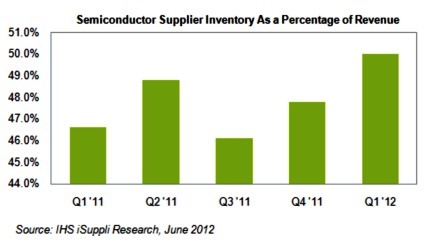關鍵字:半導體庫存
IHS iSuppli指出,雖然半導體庫存水位在過去兩季連續上漲,但其理由與對市場的影響卻大不相同。“2011年第四季的半導體庫存水位上揚原因,是由于歐債危機等因素導致的宏觀經濟景氣不明,導致全球市場對半導體的需求出現衰退。”IHS分析師Sharon Stiefel表示,2011年第四季半導體供貨商庫存水位上升同時,客戶的芯片庫存是減少的,顯示需求降低;但在2012年第一季,芯片供貨商庫存水位增加,則是反映需求有所成長。
Stiefel指出:“芯片供貨商與客戶的庫存水位都出現成長,意味著供應端與需求端都認為電子產業大環境的發展朝向正面。”在3月份,IHS預期半導體供貨商第一季平均庫存天數將繼2011年第四季達到11天的高點之后,減少0.5%。
電子零件通路業的半導體庫存量占據營收比例,在2011年第四季由第三季的41.7%減少至36.9%;其它半導體客戶端也有類似的狀況。不過IHS指出,在2012年第一季,半導體供貨商訂單量增加,訂單出貨比也達到平均,意味著供需狀況逐漸達到平衡。這樣的發展情勢再加上對第二季需求成長的預期,使得半導體供貨商庫存再度上揚。

半導體庫存水位變化

半導體庫存占據廠商營收比例
但盡管市場景氣有所改善,部分領域廠商應該要維持不動,特別是內存業者;IHS指出,內存供貨商過去通常會以提升產能的方式來因應需求成長,如此就會導致供應過剩。此外模擬芯片市場也有潛在問題,因為該領域會高度反映在景氣循環中通常復蘇速度較慢的工業用通訊基礎設施等市場。
不過IHS表示,隨著整體半導體市場銷售額預期在今年將呈現成長,半導體庫存在其中占據的比例也會跟著成長;對于需求逐漸恢復穩定的預期,將讓半導體供貨商更確信庫存水位保持在適當的位置。
Q1 chip inventories signal rising demand, IHS says
Dylan McGrath
SAN FRANCISCO—Semiconductor suppliers increased their inventories for the second straight quarter in the first quarter, this time driven by anticipation of higher demand from customers, according to a report by market research firm IHS iSuppli.
Total chip inventory as a percentage of suppliers' revenue amounted to 50 percent in the first quarter, up from 47.8 percent in the fourth quarter of 2011 and from 46.1 percent in the third quarter of 2011, IHS said.
While inventory increased in each of the last two quarters, the reasons for the increases and the implications for the market differed dramatically, according to IHS iSuppli's latest Inventory Insider market brief.
"In the fourth quarter, inventory rose among suppliers because of uncertain macroeconomic conditions such as the sovereign debt crisis in Europe, leading to an overall decline in the worldwide demand for semiconductors," said Sharon Stiefel, semiconductor inventory analyst at IHS, in a statement.
While chip suppliers' inventories rose in the fourth quarter of 2011, customers' chip stockpiles declined, indicative of lower demand, Stiefel said. But, in contrast, the higher inventory among chip suppliers in the first quarter signal better demand to come, Stiefel said.
"There was an increasing level of inventory both among chip suppliers and customers, indicating that both the supply and demand sides of the business believe that the environment in the electronics market has turned positive," Stiefel said.
In March, IHS said it expected average days of inventory held by semiconductor suppliers to decline by 0.5 percent in the first quarter after hitting an 11-year high in the fourth quarter of 2011.
Customer inventory held by electronics distributors fell to 36.9 percent of revenue in the fourth quarter of 2011, down from 41.7 percent in the third quarter, according to IHS. The same pattern of decreasing inventory replicated across various semiconductor customer segments during the same period, the firm said.
But in the first quarter of this year, suppliers saw order bookings fill up, allowing them to gain greater visibility into the supply chain, according to IHS. Book-to-bill ratios are also close to reaching parity, indicating more balanced supply-and demand dynamics, the firm said. Such developments, combined with anticipated higher demand for the second quarter, led to a rise in inventory as a percentage of supplier revenue during the first quarter, according to IHS.
But despite the improvement in market conditions, some problem areas do persist, especially in the memory segment, IHS said. Memory chip vendors have historically responded to increased demand by bringing more capacity online, leading to oversupply, the firm noted.
IHS said another potential problem area is the analog chip market. The analog market is highly exposed to markets like industrial communications infrastructure that are traditionally slower to rebound from cyclical downturns.
But IHS said that as overall semiconductor sales increase over the course of this year, the ratio of inventory to sales increasingly should come into alignment. The anticipated return to moderate demand will also give semiconductor suppliers an extra dose of confidence in knowing that their inventory levels are appropriate, IHS predicted.
 移動設備訪問
移動設備訪問